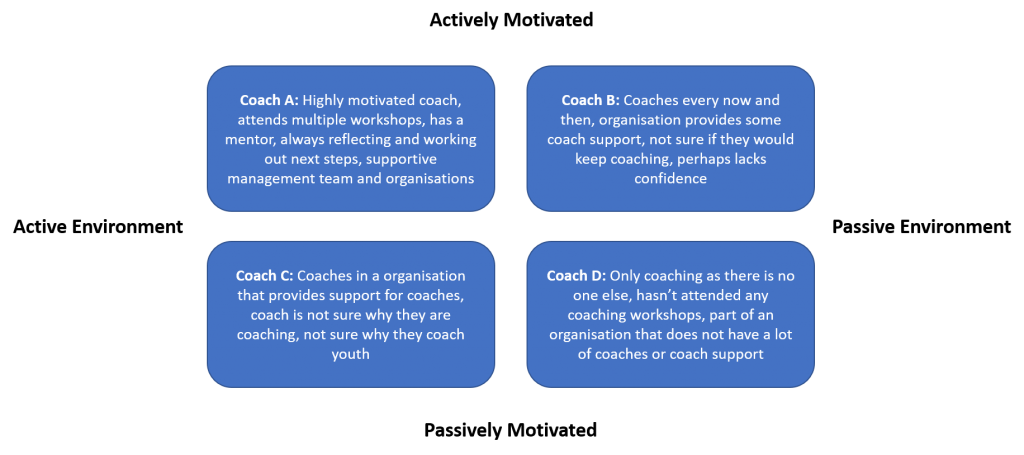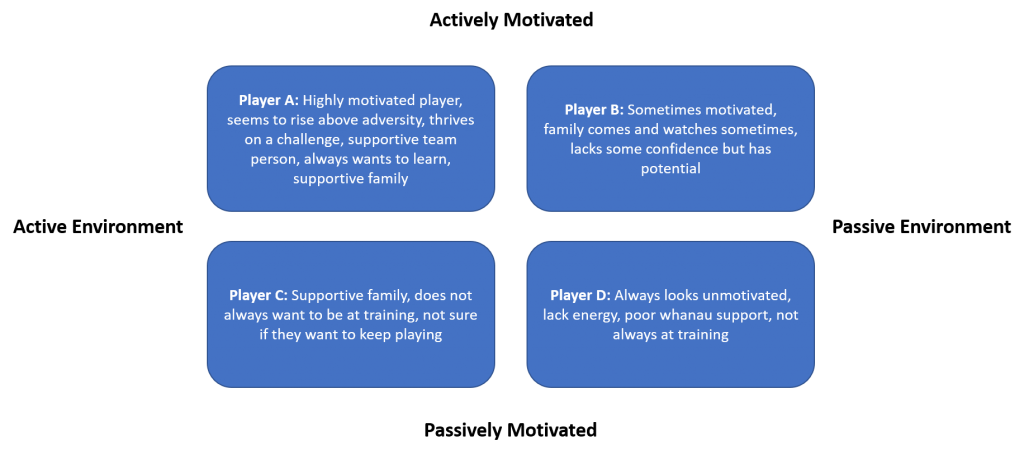In this article, Sport Development Consultant, Charissa Barham shares some valuable ideas on creating positive sporting environments and understanding our purpose as coaches.
Hāpaita te ara mātauranga, kia haukaha te tipu ō ngā rangatira mō āpōpō.
Reflecting on my time as Head Coach of the New Zealand Secondary Schools Netball Team and the National Youth Development Manager at Netball New Zealand, one of the questions I most frequently get asked is, “what makes a successful secondary school coach?”
Before I try to answer that question, however, it’s important to understand who secondary school coaches are trying to coach – rangatahi! And the thing about rangatahi is that they are often still figuring out who they are and where their place is in this world. They are battling through school, puberty and the myriad of additional stresses that come with being a young person maturing into an adult.
So, if you are a secondary school coach, whether you realise it or not, you are a guide and facilitator to the experience that our young people have in sport. It is very likely that you will play a critical part in whether a young person will want to show up tomorrow, next week or next year.
As coaches, we need to pause and ask ourselves:
- Do we know what our young people’s motivators are?
- What will keep them active?
- What stops them?
- What environments can we provide to help continue their lifelong passion for sport and physical activity?
One quote from a teenage player that has really stuck with me is:
A good coach understands that in our team we have kids that want to pull on a Ferns dress and other kids that just want to hang with their mates, but we all want to get better and have fun.
Anonymous (Secondary School Netball Player)
Each player is unique and will have different motivating factors that will determine their journey through their teenage years. As coaches, it’s important to recognise this and develop an environment that will cater to their needs.
When I asked a group of secondary school players what barriers there might be to play or engage in sport, their answers are very different to what my peers think. Adults answer with “time poor, lack of motivation, not committed, financial strain, transport”, whereas youth answer with “self-doubt, schoolwork, confidence, not good enough, top players only”.
Considering these answers, we cannot treat our youth the same as we would treat adults. They have different barriers and therefore we need to understand these to better mitigate the potential of them leaving sport.
Based on my experiences, I have developed three frameworks to help me better understand my players and to be a better overall coach to secondary school participants.
Understand your WHY
Why do I coach? What are my values and standards?
For me, coaching is about the now, with those who are in front of me, and it’s about the netball. It’s being purposeful and focussed in the quite often limited time we have together, so that the players can explore and apply, and learn at their pace, and be challenged and stretched in order to get better at what they do. And it’s about a laugh along the way.
Sandra Edge (Silver Fern #75, Wellington Netball Centre Emerging Talent Development Officer)
Coaches, ask yourself seven times (the challenge is to be able to have a different answer each time): “What is my WHY?”
In doing this, you will begin to develop a clear understanding of your coaching philosophy. In turn, you will be clear about the motivation for you to coach and in turn the environment this creates for your players. Being aware of why you coach has a trickle-down effect into all facets of your coaching, such as motivating your players, designing and running training sessions, game-day coaching practices, handling pressure and managing difficult conversations.
Right now, where do you fit in the matrix below?

Understand your players’ WHY
A successful secondary school coach allows their players to be challenged, ensures they are always learning, and most importantly makes sure the players are still having fun.
Kimiora Poi (Napier Girls and Silver Fern #175)
Taking the time to understand your “why” and your players’ “why” will lay the foundations for your planning for the season. Not only will this support your campaign and the development of your players’ skills and tactics, but it will also provide you with the building blocks to help grow the students you coach as people.
- How well do you know your athletes?
- Why are they here?
- What are their motivations?
- What ignites them?
- What aspirations do they have?
- What are the various environments they move between and what do they look like?
Answering these questions will help you to start developing an understanding of your players’ “Why”. If you want to be a great coach, this is really important.
Right now, where do your players fit in the matrix? Do different players fall into different parts of the matrix?

A good coach is someone who not only has good understanding in the sport, but also gets their athletes to believe in themselves. A good coach inspires their players to do more than they think they can, while also listening to the player and being able to form a trusting bond.
Olivia Mainland (Netball New Zealand Youth Advisory Groups)
Build a balanced programme
Someone who looks at the complete athlete, not only the one sport that they are coaching. Someone who wants to grow the athlete their specific sport and as a person.
Irene Van Dyk (Silver Fern #122 and Central Zone Junior and Youth Lead)
Build your programme based on connection, friendships and fun as you work towards improving the competence and confidence of all of your players.
As a coach, think about how you can:
- Develop transferrable character traits in your players
- Support your players to have a deep sense of caring for themselves
- Enable your players to care for each other and their communities
If you do, you are engaging in a balanced approach to coaching that will connect to the key reasons youth want to engage in sport.
Regardless of the level, we are still coaching teenagers with similar needs. Build an environment that has a balance between their own personal definition of excellence and their own personal definition of fun.
Resources to use as a coach
There are different ways to think about how you can create a balanced programme for your players. Two frameworks that I often draw from to guide my coaching values are Te whare tapa whā and the Five Cs Model of Positive Youth Development.
Te whare tapa whā
Te whare tapa whā is a philosophy developed by Sir Mason Durie, Professor of Maori Studies at the Massey University. This philosophy looks at the elements which we need to address in our youth to develop a balanced environment.
There are four parts to this philosophy and our youth will engage, evolve and mature under each pillar at different rates. These pillars will work together to provide a well-rounded experience for the individual.
- Te Taha Hinengaro (mental well-being): How do you support the self-confidence, self-esteem, decision making of your players and provide tools to enhance their psychological skills? Many of these tools are transferrable into other environments.
- Te Taha Wairua (spiritual well-being): How do you create a sense of belonging and embed the belief systems of your players and your team into your planning?
- Te Taha Tinana (physical well-being): How do you plan your sessions to improve all the physical skills required to play netball and also keep your players active?
- Te Taha Whanau (social well-being): How do bring on your journey the whanau and build a team culture that enhances positive peer relationships?
The Five Cs Model of Positive Youth Development
The Five Cs Model of Positive Youth Development, developed by Richard Lerner, Professor of Human Development at Tufts University, is an interactive framework that underpins successful youth programmes and healthy development.
Below I have adapted the model for secondary school netball coaches:
Competence – How do you develop physical skills? Interpersonal skills, decision making, work habits?
Connection – How do you connect youth into your environment and connect to their wider social environments, school, peers, whanau, communities?
Character – What is character – 1-2 activities to develop and drive character development – respecting your community, society, cultures and team environment?
Confidence – What tools/coaching practises have you planned to develop confidence, self-worth and self-efficacy?
Caring – How do develop a sense of empathy for others?
Contribution – What opportunities are there for youth to transfer the skills they are learning to contribute to their community?
So, what makes a successful coach?
To me, the successful coaches, are:
- Self-aware – they do their homework on knowing why they coach and why their players play.
- Continuous learners – they are always seeking ways to improve how they coach.
- Good at facilitating balance – they can create an environment that at times will challenge their players but will also allow players to have fun. Importantly, they will support players to build confidence in themselves and to connect, make friends and share memories with others on the same journey. The better balanced your player feels, the higher the chance your player will stay involved versus seeking other options or even stopping altogether.
My challenge to other secondary school coaches is to have a well-rounded approach that ignites and supports a love of netball within not only yourself as a coach, but also your players and their whanau.
Image Credit: Sport NZ







